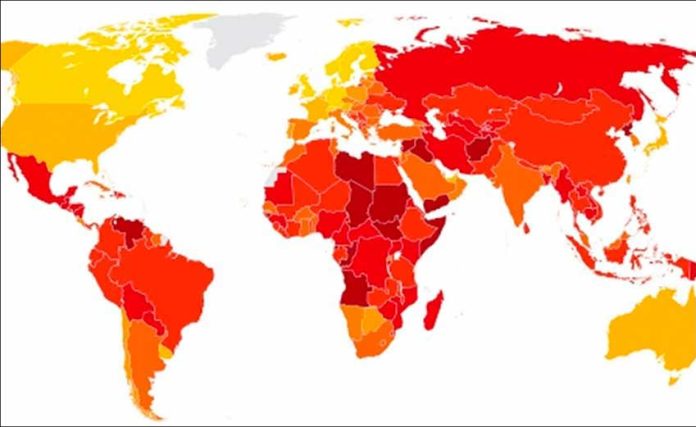Mexico’s ranking on an international corruption index plummeted 33 places during former president Enrique Peña Nieto’s six-year term, a period in which the government was embroiled in several damaging scandals.
Transparency International’s 2018 Corruption Perception Index placed Mexico in 138th place in the ranking of 180 countries, three spots below its 2017 ranking. When Peña Nieto took office in 2012, Mexico ranked 105th.
However, in subsequent years, Peña Nieto and the Institutional Revolutionary Party (PRI) government he led were plagued by a range of scandals that analysts believe contributed heavily to the party’s crushing defeat at last year’s elections.
They included the disappearance of 43 teaching students in Guerrero, the so-called White House scandal in which the former president’s wife purchased a mansion built by a favored government contractor, the Master Fraud embezzlement scheme, the use of spyware to monitor government critics and allegations that the former CEO of Pemex accepted bribes from Brazilian company Odebrecht.
Transparency International also pointed out that several governors in Mexico have also been caught up in corruption scandals.
In the organization’s latest index published yesterday, Mexico sits on a par with Guinea, Iran, Lebanon, Papua New Guinea and Russia, all of which achieved a score of 28 out of 100.
A score of zero means that a country is highly corrupt, while 100 means that it is very clean.
“In Mexico, basic political rights, including freedom of expression and press freedom, have sharply declined. Without a free media to provide oversight to government, the ability to prevent and denounce corruption is limited,” Transparency International said in its Americas report.
Mexico’s ranking is the lowest of all 36 member countries of the Organization for Economic Co-operation and Development (OECD) and only slightly above Guatemala and Nicaragua, both of which Transparency International said were suffering from “democratic governance crises.”
Eduardo Bohórquez, director of the Mexico office of Transparency International, said that impunity was a significant factor that has allowed corruption to flourish.
“Preventative measures taken until now lose their effectiveness when those who participate in networks of corruption know very well that they won’t be sentenced and that they will be able to keep money diverted from the public purse,” he said.
President López Obrador, who took office on December 1, has vowed to combat corruption, but has said that his government will only seek to prosecute past presidents if the public demands it.
First on the 2018 Corruption Perception Index was Denmark, with a score of 88 out of 100, followed by New Zealand, which was one point behind. Finland, Singapore, Sweden and Switzerland shared third place.
In the Americas, Canada was the highest ranked country at ninth followed by the United States, which ranked 22nd and Uruguay, which placed 23rd.
The world’s most corrupt countries, according to the rankings, are Somalia, Syria and South Sudan, with scores of just 10, 13 and 13 respectively.
Source: Reforma (sp)
